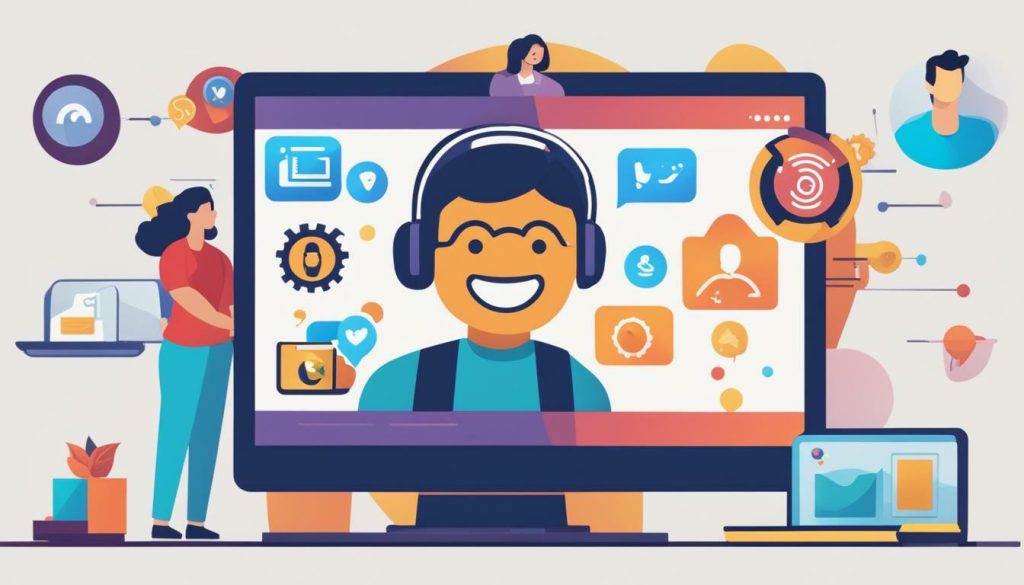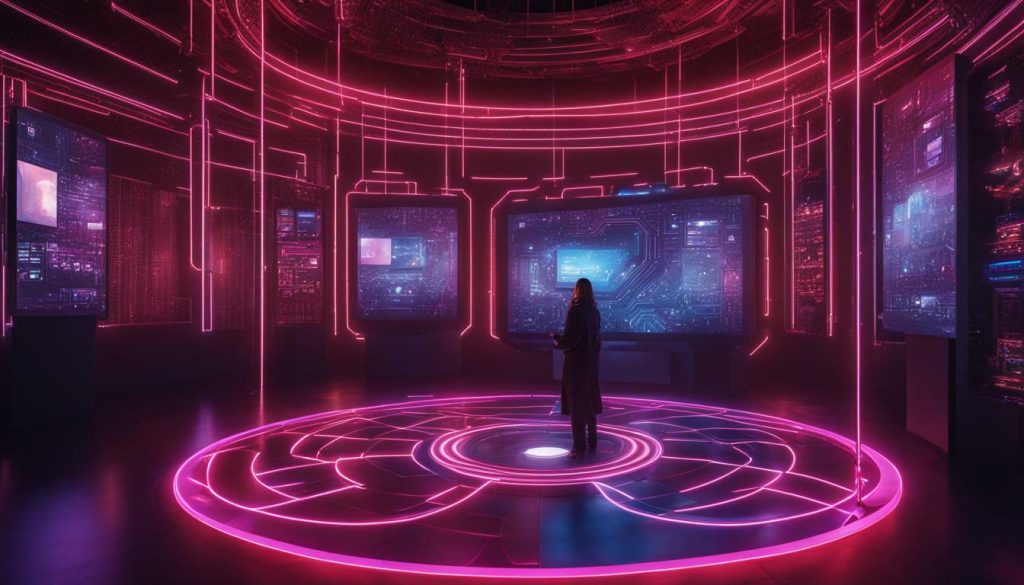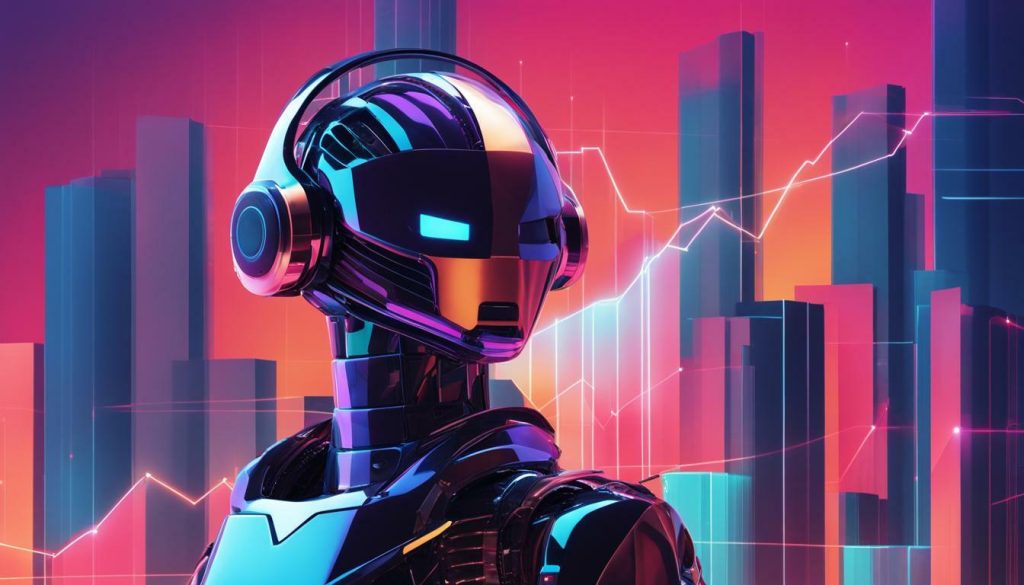Chatbots vs. Human Agents: Unveiling the Best For Business

In today’s digital era, businesses are faced with the decision of whether to rely on chatbots vs. human agents for customer support. The debate surrounding chatbots and human agents in customer service has gained significant attention.
As businesses strive to improve efficiency and customer satisfaction, it becomes crucial to explore the advantages of chatbots and the benefits of human agents.
- Chatbots, powered by AI and NLP, provide instant and personalized communication.
- Users perceive chatbots as incapable of providing high-quality communication, leading to decreased preferences and loyalty.
- Chatbots offer prompt responses, omnichannel support, consistent support experience, leads and sales generation, improved customer engagement, and cost-effectiveness.
- Human agents are irreplaceable in handling complex situations, dealing with angry customers, showing empathy, adapting to different situations, and physical review and inspection.
- Businesses can use chatbots for online shopping, customer service, and virtual assistants.
The Rise of Chatbots in Customer Service
The integration of AI-powered chatbots has revolutionized the way businesses handle customer service interactions. These advanced virtual assistants leverage artificial intelligence and natural language processing to provide immediate and personalized communication to customers, making them a valuable asset for businesses seeking to streamline their customer support operations.
Chatbots for businesses have proven to be highly effective in various applications, including online shopping, customer service, and acting as virtual assistants. By incorporating chatbots into their operations, businesses can enhance customer experience, improve efficiency, and reduce costs.
One of the key advantages of chatbots is their ability to provide prompt responses across multiple channels. Whether it’s through a company’s website, social media platforms, or messaging apps, chatbots can engage with customers in real-time, answering their queries and providing assistance around the clock.
| Advantages of Chatbots | Benefits of Using Chatbots |
|---|---|
| 1. Instant and personalized communication | 1. Handling multiple conversations simultaneously |
| 2. 24/7 support availability | 2. Cost-effectiveness |
| 3. Consistent support experience | 3. Time-saving |
| 4. Improved customer engagement | 4. Proactive customer interaction |
| 5. Omnichannel support | 5. Monitoring and analyzing consumer data |
| 6. Leads and sales generation | 6. Improved customer engagement |
| 7. Cost-effectiveness |

However, it’s important to note that while chatbots excel at automating routine tasks and providing instant responses, they have limitations when it comes to replicating human-like communication. This can impact customer preferences and loyalty, as some users may still prefer the human touch provided by human agents.
In the next section, we will explore the indispensable role of human agents in customer support and the benefits they bring to businesses.
The Human Touch in Customer Support
While chatbots offer efficiency, the human touch remains crucial in certain aspects of customer support. Human agents possess unique qualities that enhance the customer experience and complement the capabilities of chatbots.
They excel in handling complex situations, exhibiting empathy, and adapting to various customer needs, providing a personal touch that some customers find essential for a satisfying customer experience. Research reveals that customers still perceive chatbots as incapable of providing high-quality communication, leading to decreased preferences and loyalty.
Human agents are irreplaceable when it comes to dealing with complex situations and handling angry customers. Their ability to empathize, understand the emotional state of customers, and respond accordingly helps to diffuse difficult situations and build trust.
Additionally, human agents are adept at adapting to different scenarios and finding creative solutions that go beyond the limitations of chatbots. They can conduct physical reviews and inspections, which are essential in certain industries where a physical presence is required.
To illustrate the importance of the human touch, consider a scenario where a customer is frustrated with a product malfunction. A chatbot may provide prompt responses and attempt to troubleshoot the issue, but a human agent can offer genuine empathy, actively listen to the customer’s concerns, and provide personalized guidance to resolve the problem effectively. This level of understanding and care is difficult for chatbots to replicate.
Customer satisfaction is not solely about efficiency; it is about creating a positive emotional connection. Human agents play a vital role in fostering that connection through their ability to understand and empathize with customers.
By combining the strengths of chatbots and human agents, businesses can optimize their customer service operations. Chatbots offer prompt responses, omnichannel support, consistent support experience, leads and sales generation, improved customer engagement, and cost-effectiveness.
On the other hand, human agents provide the human touch that is essential for enhancing customer experience. Businesses can leverage chatbots for various applications in online shopping, customer service, and virtual assistants, while relying on human agents for more complex and emotionally sensitive interactions.
| Chatbots | Human Agents |
|---|---|
| Efficient and prompt responses | Ability to handle complex situations |
| Omnichannel support | Emotional intelligence and empathy |
| Consistent support experience | Adapting to different customer needs |
| Leads and sales generation | Physical review and inspection |
| Improved customer engagement | Personalized and humanized communication |
| Cost-effectiveness | Building trust and rapport |

By recognizing the importance of the human touch in customer support and strategically incorporating chatbots into their operations, businesses can strike the right balance between efficiency and personalized service. The future of customer service lies in leveraging the strengths of both chatbots and human agents, providing customers with a seamless and satisfying experience.
Chatbots vs. Human Agents: Pros and Cons
Chatbots offer numerous benefits, but it is important to acknowledge their limitations when compared to human agents.
On the positive side, chatbots provide prompt responses, ensuring that customers receive immediate assistance without having to wait in long queues. They also offer omnichannel support, allowing customers to engage with them on various platforms, such as websites, social media, and messaging apps. This ensures a consistent support experience regardless of the channel used.
Furthermore, chatbots are capable of generating leads and sales by engaging customers in personalized conversations and recommending products or services based on their preferences. Their ability to analyze consumer data also allows for improved customer engagement, as they can provide relevant and targeted recommendations.
Additionally, chatbots are cost-effective for businesses, as they can handle multiple conversations simultaneously, reducing the need for a large customer service team. They also save time for both customers and businesses by providing instant responses and resolving issues efficiently.
Chatbot vs. Live Agent Comparison
However, it is crucial to recognize that chatbots have certain limitations. One of the main drawbacks is their inability to replicate human-like communication. While chatbots can provide scripted responses and follow predefined rules, they often lack the ability to understand complex queries or exhibit empathy towards customers.
Human agents, on the other hand, excel in handling complex situations and dealing with angry customers. They can adapt their communication style to suit individual customer needs and provide a human touch that is often valued by customers for a satisfying customer experience. Human agents are also essential in conducting physical reviews and inspections, which chatbots cannot perform.
| Pros of Chatbots | Cons of Chatbots |
|---|---|
| – Prompt responses | – Inability to replicate human-like communication |
| – Omnichannel support | – Lack of empathy |
| – Consistent support experience | |
| – Leads and sales generation | |
| – Improved customer engagement | |
| – Cost-effectiveness |
In conclusion, while chatbots offer numerous benefits such as prompt responses, omnichannel support, and cost-effectiveness, they also have limitations when it comes to human-like communication and empathy. Human agents, on the other hand, excel in handling complex situations and providing a personal touch that cannot be replicated by chatbots.
Striking the right balance between chatbots and human agents is crucial for businesses to optimize their customer service operations and ensure maximum efficiency and customer satisfaction.
The Indispensable Role of Human Agents
While chatbots offer efficiency, human agents bring a level of expertise and human touch that cannot be replicated. In customer service, certain situations require the empathy and understanding that only a human agent can provide. Dealing with angry customers, handling complex issues, and adapting to different scenarios are all areas where human agents excel.
One of the key benefits of human agents is their ability to show empathy and build a deeper connection with customers. This personal touch creates a positive experience and fosters customer loyalty. Human agents can also conduct physical reviews and inspections, offering an added layer of service that cannot be delivered by chatbots alone.
To illustrate the indispensable role of human agents, consider the following comparison:
| Chatbots | Human Agents |
|---|---|
| Provide immediate responses | Show empathy and build rapport |
| Automate repetitive tasks | Handle complex situations |
| Assist in basic inquiries | Adapt to different customer needs |
| Deliver consistent support experience | Conduct physical reviews and inspections |
As the table demonstrates, chatbots and human agents each have their strengths and limitations. By combining their capabilities, businesses can provide a comprehensive customer service experience that meets the demands of all customers.

Chatbots and Business Applications
Chatbots have found their place in various business applications, transforming the way companies interact with customers. With advancements in artificial intelligence (AI) and natural language processing (NLP), chatbots are now being utilized as virtual assistants, customer service representatives, and even personal shoppers. Their ability to provide immediate and personalized communication has made them valuable assets for businesses looking to enhance customer experience and streamline processes.
One of the key applications of chatbots is in online shopping. By integrating chatbots into e-commerce platforms, businesses can offer customers a seamless and interactive shopping experience.
Chatbots can assist customers by recommending products based on their preferences, answering questions about product details and availability, and even processing transactions. This not only improves customer engagement but also increases the efficiency of the online shopping process.
Additionally, chatbots are being used as virtual assistants in various industries. From scheduling appointments and providing information to offering technical support, chatbots can handle a wide range of tasks autonomously. This frees up human agents to focus on more complex and specialized customer inquiries, ultimately improving overall efficiency and customer satisfaction.
| Chatbots in Business Applications | Benefits |
|---|---|
| Online Shopping | Streamlined shopping experience Interactive customer engagement Efficient order processing |
| Virtual Assistants | Autonomous task handling Improved human agent productivity Enhanced customer satisfaction |
| Customer Service | Prompt and personalized support Omnichannel communication Consistent customer experience |
Finally, chatbots are revolutionizing customer service by providing prompt and personalized support across multiple channels. They can instantly respond to customer inquiries, 24/7, ensuring that no query goes unanswered. This leads to reduced wait times, minimized customer stress and annoyance, and ultimately improves the overall customer experience.
By gathering and analyzing consumer data, chatbots also enable businesses to understand their customers better and provide tailored solutions.
In conclusion, chatbots have become indispensable tools for businesses in various applications. Whether it’s assisting customers with online shopping, acting as virtual assistants, or providing customer service, chatbots bring efficiency, convenience, and improved customer experience. By leveraging the power of AI and NLP, companies can optimize their interactions with customers and stay ahead in today’s competitive market.

Chatbots have the potential to transform customer experience, providing a range of benefits to both businesses and customers. With their AI-powered capabilities, chatbots offer instant and personalized communication, making interactions with customers more efficient and convenient. They reduce wait times, provide 24/7 support, and minimize stress and annoyance by addressing customer queries and issues promptly.
One of the key advantages of chatbots is their ability to personalize the customer journey. By analyzing consumer data, chatbots can tailor their responses and recommendations to each individual, creating a more customized experience. This personalized CX not only enhances customer satisfaction but also increases customer engagement and loyalty.

Furthermore, chatbots add customized elements to the customer experience, making it more interactive and enjoyable. They can provide product recommendations, answer frequently asked questions, and even engage in small talk, creating a more natural and human-like conversation. With the ability to understand context and intent, chatbots can offer a seamless and immersive experience that leaves customers feeling heard and valued.
Chatbots offer a proactive approach to customer interaction, addressing customer queries and issues promptly, which ultimately leads to more efficient customer service automation.
However, it is important to note that while chatbots bring significant benefits, they cannot replace human agents entirely. Human agents excel in handling complex situations, exhibiting empathy, and adapting to various customer needs. Additionally, human agents play a vital role in conducting physical reviews and inspections, which are essential in certain industries.
The Future of Chatbots and Human Agents
As technology continues to advance, the future of customer service lies in finding the right balance between chatbots and human agents. By leveraging chatbots for routine and repetitive tasks, businesses can free up human agents to focus on more complex and high-touch interactions.
Overall, chatbots have proven to be a powerful tool in transforming customer experience. When properly implemented and integrated into business operations, chatbots can enhance customer satisfaction, improve engagement, and streamline customer service processes, ultimately benefiting both businesses and customers alike.
The Future of Chatbots and Human Agents
The future of customer service lies in finding the perfect harmony between chatbots and human agents. While chatbots have made significant advancements in providing instant and personalized communication, many users still prefer the human touch. Research shows that users perceive chatbots as incapable of delivering high-quality communication, resulting in decreased preferences and loyalty.
However, studies on the effects of chatbots are relatively new, with a primary focus on adoption and acceptance. To improve user adoption, researchers suggest adding anthropomorphic characteristics to chatbots and matching them to appropriate application contexts. This can enhance the user experience and increase trust in their capabilities.
Chatbots bring several advantages to businesses, including prompt responses, omnichannel support, consistent support experience, leads and sales generation, improved customer engagement, and cost-effectiveness. They can handle multiple conversations simultaneously, saving time and resources for businesses. Furthermore, chatbots enable proactive customer interaction by monitoring and analyzing consumer data, leading to improved customer engagement.
Despite these advantages, human agents play an irreplaceable role in customer service. They excel in handling complex situations, dealing with angry customers, exhibiting empathy, adapting to various customer needs, and conducting physical reviews and inspections. Their human capabilities and expertise make them invaluable in certain aspects of customer support.
In conclusion, the future of customer service lies in leveraging the strengths of both chatbots and human agents. By finding the right balance and deploying these resources strategically, businesses can optimize their customer service operations for maximum efficiency and customer satisfaction.

The adoption of chatbots is transforming businesses, offering a range of benefits to both companies and their customers. Powered by AI and natural language processing (NLP), chatbots provide instant and personalized communication, streamlining customer service operations and improving overall efficiency.
They bring several advantages to businesses, including prompt responses, omnichannel support, consistent support experience, leads and sales generation, improved customer engagement, and cost-effectiveness.

However, despite these advantages, chatbots still face certain limitations. Users perceive chatbots as incapable of providing high-quality communication, leading to decreased preferences and loyalty. Research on the effects of chatbots is relatively new, with studies focusing on their adoption and acceptance.
To enhance user adoption, chatbots can be designed with anthropomorphic characteristics and matched to appropriate application contexts.
Conclusion
To achieve the best results, businesses must leverage both chatbots and human agents, harnessing their respective strengths to provide exceptional customer service.
While chatbots excel in efficiency and automation, human agents provide the human touch and expertise required for complex situations.
By finding the right balance between chatbots and human agents, businesses can optimize their customer service operations for maximum efficiency and customer satisfaction.
Keep the curiosity alive! Explore our blog for thought-provoking insights at the crossroads of health and technology. Your journey to a better, tech-enhanced life begins here.
FAQ
How do chatbots and human agents enhance customer service?
Chatbots and human agents enhance customer service by providing instant and personalized communication, improving efficiency, and creating a positive customer experience.
Why are chatbots preferred less by users compared to human agents?
Users perceive chatbots as incapable of providing high-quality communication, leading to decreased preferences and loyalty.
What does research on chatbots focus on?
Research on chatbots primarily focuses on their adoption and acceptance among users.
How can chatbots improve user adoption?
Adding anthropomorphic characteristics to chatbots and matching them to appropriate application contexts can improve user adoption.
What are the advantages of using chatbots in customer service?
Chatbots offer prompt responses, omnichannel support, consistent support experience, leads and sales generation, improved customer engagement, and cost-effectiveness.
What are the benefits of human agents in customer service?
Human agents excel in handling complex situations, dealing with angry customers, showing empathy, adapting to different situations, and physical review and inspection.
In what business applications can chatbots be used?
Chatbots can be used for online shopping, customer service, and virtual assistants in businesses.
How are chatbots changing businesses and customer experience?
Chatbots are reducing wait times, providing 24/7 support, minimizing stress and annoyance, personalizing customer experience, and adding customized elements.
What are the benefits of using chatbots in customer service?
The benefits of using chatbots include handling multiple conversations, cost-effectiveness, time-saving, proactive customer interaction, monitoring and analyzing consumer data, and improving customer engagement.






